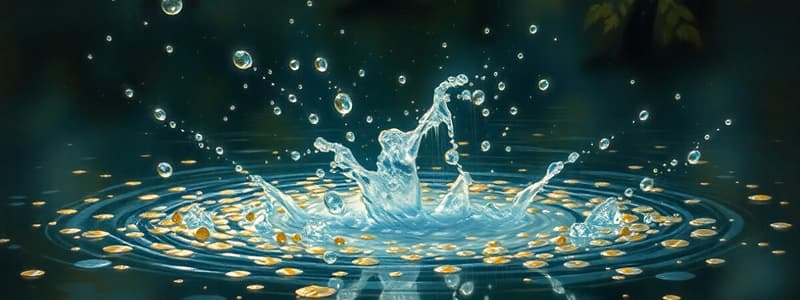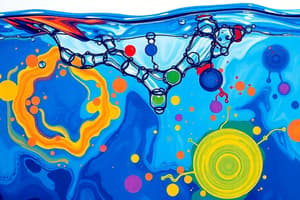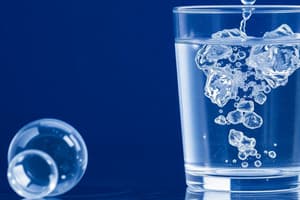Podcast
Questions and Answers
What is the equilibrium constant (Keq) for pure water at 25°C?
What is the equilibrium constant (Keq) for pure water at 25°C?
- 1.8 x 10^-18 M
- 1.8 x 10^-14 M
- 1.8 x 10^-16 M (correct)
- 1.8 x 10^-12 M
Which of the following describes how pH can be accurately measured in a laboratory?
Which of the following describes how pH can be accurately measured in a laboratory?
- Using sodium ion concentration readings
- Using phenolphthalein for color change observation
- Using a glass electrode sensitive to H+ concentration (correct)
- Using litmus paper
What characterizes a strong acid in an aqueous solution?
What characterizes a strong acid in an aqueous solution?
- Forms weak conjugate bases
- Partially ionized
- Completely ionized (correct)
- Has higher pKa values
Which of the following pairs illustrates a conjugate acid-base pair?
Which of the following pairs illustrates a conjugate acid-base pair?
What is indicated by a higher ionization constant (Ka) for an acid?
What is indicated by a higher ionization constant (Ka) for an acid?
How do weak acids behave when dissolved in water?
How do weak acids behave when dissolved in water?
What role do indicator dyes play in measuring pH?
What role do indicator dyes play in measuring pH?
Which of the following acids is considered weak?
Which of the following acids is considered weak?
What mechanism in animals utilizes the high latent heat of vaporization of water?
What mechanism in animals utilizes the high latent heat of vaporization of water?
What property of water contributes to its ability to sustain stable temperatures within cells?
What property of water contributes to its ability to sustain stable temperatures within cells?
Which process primarily explains the ability of water to allow small animals to walk on its surface?
Which process primarily explains the ability of water to allow small animals to walk on its surface?
What type of molecules does water primarily dissolve, due to its polarity?
What type of molecules does water primarily dissolve, due to its polarity?
What is the form in which hydrogen ions exist in pure water?
What is the form in which hydrogen ions exist in pure water?
How is the equilibrium constant (Keq) for a reaction defined?
How is the equilibrium constant (Keq) for a reaction defined?
What property of water is illustrated by its difficulty to freeze?
What property of water is illustrated by its difficulty to freeze?
What term describes substances that do not dissolve well in water?
What term describes substances that do not dissolve well in water?
What property of water is primarily responsible for its higher boiling point compared to other common solvents?
What property of water is primarily responsible for its higher boiling point compared to other common solvents?
Which type of molecules readily form hydrogen bonds with water, increasing their solubility?
Which type of molecules readily form hydrogen bonds with water, increasing their solubility?
What is a characteristic of water's specific heat capacity?
What is a characteristic of water's specific heat capacity?
Which of the following statements about hydrophobic interactions is true?
Which of the following statements about hydrophobic interactions is true?
Why is water considered the 'solvent of life'?
Why is water considered the 'solvent of life'?
What role do hydrogen bonds play in the structure and function of biomolecules?
What role do hydrogen bonds play in the structure and function of biomolecules?
Which of the following is NOT a consequence of water's hydrogen bonding?
Which of the following is NOT a consequence of water's hydrogen bonding?
Which molecule is likely to have a high boiling point due to its capacity to form hydrogen bonds?
Which molecule is likely to have a high boiling point due to its capacity to form hydrogen bonds?
Flashcards are hidden until you start studying
Study Notes
Water's Unique Properties
- Water's high melting point, boiling point, and heat of vaporization result from hydrogen bonding between water molecules, creating strong internal cohesion. This contrasts with molecules like butane, which lacks hydrogen bonding and has a much lower boiling point.
- Hydrogen bonds are crucial for the solubility of polar solutes like alcohols, aldehydes, ketones, and sugars in water. These solutes form hydrogen bonds with water molecules.
- Amphipathic molecules possess both hydrophilic (water-loving) and hydrophobic (water-hating) regions. (Specific examples were not provided in the text.)
- Hydrophobic interactions are driven by the tendency of nonpolar molecules to aggregate in water, maximizing water's entropy. This is crucial for membrane formation and protein folding.
Water and Life
- Water's high specific heat capacity (4.2 J g⁻¹ °C⁻¹) minimizes temperature fluctuations in cells and environments.
- Water's high latent heat of vaporization makes it an effective coolant (sweating, panting, transpiration).
- Water's high latent heat of fusion makes it difficult to freeze, protecting cells from ice crystal formation.
- Water's cohesive properties (due to hydrogen bonding) allow water to be transported in plants (transpiration) and contribute to surface tension.
- Water's polarity makes it an excellent solvent for charged and polar molecules (hydrophilic), while it poorly dissolves nonpolar molecules (hydrophobic).
- Water plays an essential role in virtually all cellular processes and forms the majority of living systems, acting as a solvent and participating in numerous reactions.
Water Ionization and pH
- Pure water slightly ionizes into hydronium ions (H₃O⁺) and hydroxide ions (OH⁻).
- The ion product of water (Kw) is 1.8 x 10⁻¹⁶ M at 25°C.
- The pH scale is used to measure the concentration of H⁺ ions (and thus OH⁻ ions), with neutral pH being 7.
- pH measurement is crucial in biochemistry and is often performed using a glass electrode, which is sensitive to H⁺ concentration.
- Acid-base reactions in aqueous solutions are very fast due to a phenomenon called proton hopping.
Acids, Bases, and Dissociation Constants
- Strong acids (e.g., HCl, H₂SO₄, HNO₃) completely ionize in dilute aqueous solutions.
- Strong bases (e.g., NaOH, KOH) also completely ionize.
- Weak acids and bases do not completely ionize in water and are common in biological systems.
- Acids are defined as proton donors, while bases are proton acceptors.
- A conjugate acid-base pair consists of a proton donor and its corresponding proton acceptor (differing by a proton).
- The acid dissociation constant (Ka) quantifies an acid's tendency to lose a proton; larger Ka values indicate stronger acids.
Studying That Suits You
Use AI to generate personalized quizzes and flashcards to suit your learning preferences.




